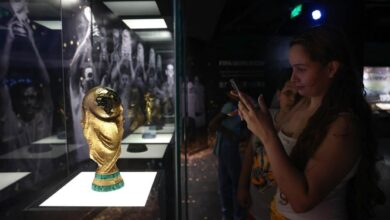The Albiceleste ‘Curse’: 28 years without winning any official tournament
When it comes to senior selection, Argentina has not won titles since the 1993 Copa América in Ecuador, but what have been the reasons for this?.

The “albicelestes” have accumulated 28 years without being champions of anything, since they won the 1993 Copa América held in Ecuador. Photo: soccer.ru
LatinAmerican Post | Onofre Zambrano
Listen to this article
Leer en español: The Albiceleste ‘Curse’: 28 years without winning any official tournament
Argentina is one of the national teams with the most tradition and achievements throughout its history. However, the 'albicelestes' accumulate 28 years without being champions of anything, since they were awarded the 1993 Copa América held in Ecuador.
Since July 4 of that year in Guayaquil, Argentina has played 17 tournaments, being runner-up seven times, three of them in consecutive years between the 2014 World Cup in Brazil (1-0 loss to Germany in overtime), and the 2015 America Chile Cups. and Centenario 2016 losing in both cases to his counterpart from Chile in the penalty shootout. But what could be the reasons for this debacle? Let's focus on America's Cup.
Also read: American-born soccer players who are in the Eurocup
Argentina 28 años sin ganar la Copa América
La Albiceleste es la segunda mayor ganadora en la historia del torneo, pero ya acumula 28 años sin ser campeón del certamen.
Argentina ha alcanzado 4 finales desde el último título en 1993.@afa @fundacionmessi pic.twitter.com/OJhzJEl329— Novedadeseneldeporte (@Novedadeseneld1) June 13, 2021
Comienza una nueva ilusión para Argentina ????????, que no gana la Copa America desde 1993
¿Cómo crees que saldrá la Selección en Brasil?
— Leandro Buonsante (@BuonsanteLean) June 14, 2021
Pressure: Copa América case
Although the talent has remained intact, the "Albiceleste" simply has not been able to win any tournament after 1993 in its senior team and the summit of the case is that it is not due to a lack of quality of its players precisely, as if it has happened with other teams that go into a drought because the replacement generations are not talented like those that preceded them.
Names that have formed brilliant generations emerged from the southern country such as those of the coaches Alfio Basile, Sergio Batista, José Pekerman, Gerardo Martino or Marcelo Bielsa, and of players such as Hernán Crespo, Juan Román Riquelme, Juan Pablo Sorín, Roberto Ayala, Carlos Tévez , Sergio Agüero and Lionel Messi himself, have not been able to give a new title to their country.
Against this background, it is not difficult to consider that one of the reasons for this drought is the media pressure generated in Argentina with the selection due to a logical post-Maradona effect. Always wanting to win, and projecting a sense of obligation in the players, has not allowed teams that had everything to become champions of the Copa América in which they have participated.
Something always happens that works against them. In fact, there are four finals lost in the last six continental competitions, and even in 2011 when it hosted the Cup, it was not able to lift it, after being eliminated by the eventual champion Uruguay on penalties in the quarter-final phase.
Messi factor
Messi turns 34 this month, so, for natural reasons, the end of his career is near. This Copa América is one of his last opportunities. The problem is that the ecosystem he has in the national team is not the same as the one he has in his club.
At the Camp Nou he has teammates of a very good level, with whom he spins walls in better conditions and those details enhance his quality. The generation that Argentina has had for a few years has quality, but most are not elite players as they are at the Barça club. Besides, the fact of not playing with them with the same frequency makes the processes even more difficult.
Here, there is also a pressure issue with Messi on the court, even the southern team has shown more fluid passages in their game when the Barcelona star is not on the court. The fans of the team do not expect names like Lautaro Martínez, Ángel Di María, or Agüero himself to always be decisive, but they do expect him with Leo, and that generates frustration.
That frustration, in turn, affects Messi because of the size of the responsibility he has on his shoulders, as happened in the two finals on penalties against Chile, in which his discreet performances were highly criticized. Messi missed a penalty in the Levi's Stadium shoot-out in 2016 and the subsequent defeat prompted him to announce his retirement from the national team, a position that changed three months later.
The star, who has spent more of his life in Spain than in Argentina, has requested on a couple of occasions that everything not be destroyed after each defeat. Thus, seeing the behavior of his selected team in finals and the excessive and excessive attention that is placed on Messi, it is the pressure – which is enhanced by having one of the best players on the planet on his payroll – the main reason for the frustrations sports in the last three decades.
It is important to remember that Messi was part of the team that won gold in the 2004 JJ00 and the 2005 Holland Under-20 World Cup, being an important reference along with Sergio Agüero. Unfortunately, the successes of amateur teams often measure the expectation they have with the great soccer players.





